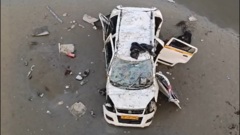A recent tragic car crash in Uttar Pradesh, India, has sparked a heated debate about the responsibilities of navigation applications like Google Maps following the death of three individuals en route to a wedding. The incident occurred when their vehicle veered off an uncompleted bridge, leading to their fall onto a riverbed below. Local police investigations suggest that Google Maps may have directed the men to this hazardous route, which had been previously damaged by floods and was visibly avoided by local residents due to its known dangers.
Authorities have since filed complaints against several engineers from the state’s road department, along with an unnamed official associated with Google Maps, accusing them of culpable homicide. Google has publicly stated its intention to cooperate with the ongoing investigation, providing insight into the ongoing scrutiny the navigation app faces regarding its accuracy and reliability.
Critics of Google Maps assert that the platform bears some responsibility for the lack of accurate road information, especially when safety is at stake. However, others point to inadequate governmental infrastructure, highlighting the absence of proper barriers and signage to indicate the bridge's condition as a broader systemic failure. The discussion raises significant questions about the implications of relying on digital navigation systems, particularly in countries like India, where road infrastructure can often be inconsistent.
With approximately 60 million active users, Google Maps has become the backbone for various transportation services across India, but it has faced previous accusations of leading users astray. Incidents reminiscent of the recent tragedy have occurred, including a 2021 case where a man drowned after driving his vehicle into a dam while using the app's directions.
While navigation apps like Google Maps utilize GPS signals from users to provide real-time traffic updates and route adjustments, experts contend that these platforms cannot feasibly monitor every road change. Ashish Nair, founder of the mapping platform Potter Maps, explains that the sheer volume of data and limited resources prevent timely updates on infrastructure changes. He argues that, under current user agreements, individuals must take personal responsibility while navigating.
The ongoing legal discourse around the accountability of GPS platforms continues to be complex. Advocates are divided, with some asserting the protections offered to digital platforms under India’s Information Technology Act, while others suggest potential liability if negligence can be proven in the failure to correct data with the awareness of inaccuracies.
As the discussion evolves, it will be critical for both policymakers and technology firms to ensure the safe integration of digital navigation in road travel. The tragic accident serves as a reminder of the pressing need for improved infrastructure, diligent monitoring, and user awareness to prevent future tragedies on the roadways.






















